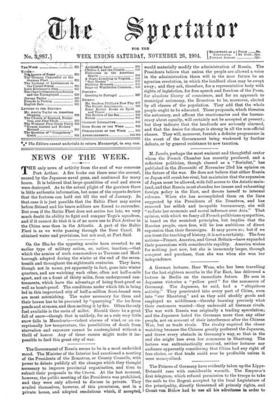A German lecturer, Herr Woas, who has been travelling for
the last eighteen months in the Far East, has delivered a lecture in Berlin on the immediate future. He sees in Japanese victories a "yellow peril" for the commerce of Germany. The Japanese, he said, had a " ubiquitous activity." They penetrated into every part of China, even into "our Shantung," and as they sold shoddy goods and employed no middlemen—thereby learning precisely what their customers wanted—they undersold all German rivals. The war with Russia was originally a trading speculation; and the Japanese hated the Germans more than any other people, not on account of their interference after the Chinese War, but as trade rivals. The rivalry required the closer watching because the Chinese greatly preferred the Japanese, and threw every obstacle in Germany's way, so that in the end she might lose even her commerce in Shantung. The lecture was enthusiastically received, neither lecturer nor audience apparently considering that China had any right of free choice, or that trade could ever be profitable unless it were monopolised.
The Princes of Germany have evidently taken up the Lippe- Detmold case with considerable warmth. The Emperor's first telegram, which refused permission to the troops to take the oath to the Regent accepted by the local Legislature of the principality, directly threatened all princely rights, and Count von Billow had to use all his adroitness in order to














































